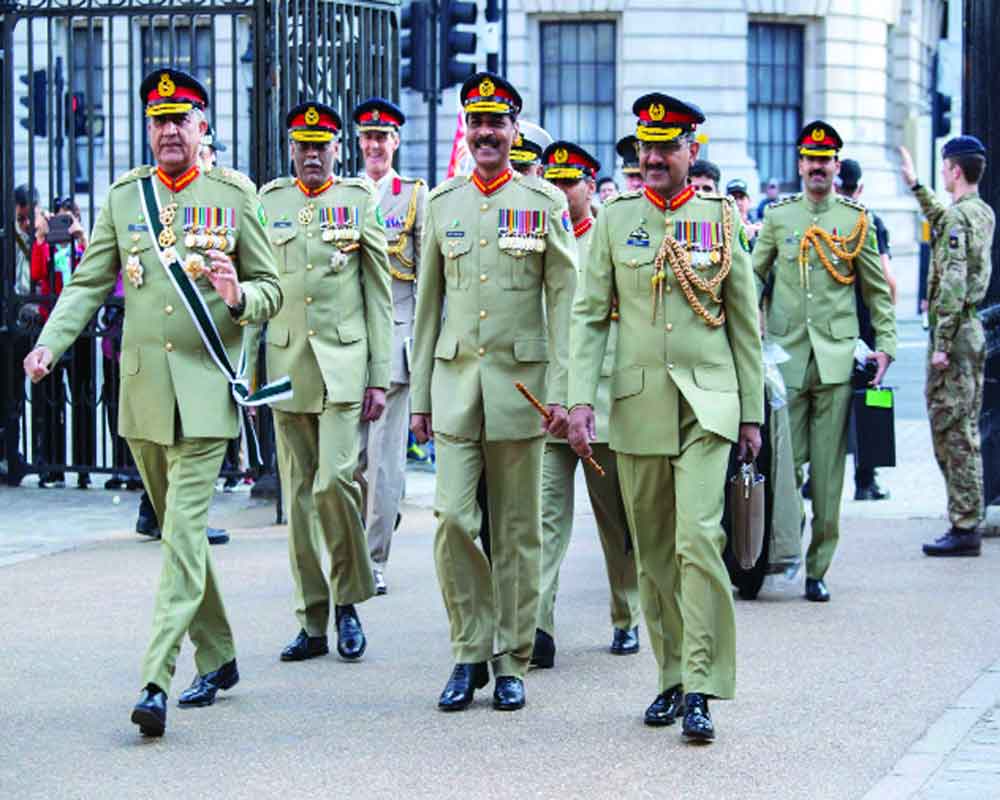General Muneer is playing a very different tune, optics, text and the accompanying outreach as part of the much-needed recalibration
It is the regressive effect of religiosity that the politicos are in no position to take a stand against religious extremism and if anything, they have to maintain a façade of matching piety and sectarianism to garner popular votes
Historically there has been an unease about Pakistani Qaid-e-Azam, Muhammad Ali Jinnah’s first Presidential address to the Constituent Assembly (Aug 11, 1947). Amongst many counterintuitive statements addressed to the first (and only) nation to be born in the name of religion, is Jinnah’s insistence on secularism and liberality, in it. Jinnah’s stand was disagreeable for those who wanted it to be the literal ‘land of the pure’ or a theocratic state. Tellingly the religious hardliners ensured that the same was blacked out from newspapers and successive governments feigned ignorance and even removed the same from official records. Even audio recordings of this landmark speech mysteriously ‘disappeared’. The shariaisation of Pakistan was enthusiastically partaken by successive dispensations and obliteration of the past and rewriting history that was bereft of any secularism or inclusivity, ensued. The Pakistan of current times is perhaps far too puritanical, extremist, and intolerant even by the standards of a Jinnah, the man who is responsible for the partition.
Today, the chickens of religious extremism are coming home to roost, and Pakistan is staring at a hopeless situation with almost all arms of governance i.e., politicians, bureaucracy, judiciary, clergy and even elements of the once secular, Pakistani Armed Forces, surrendering recklessly to such revisionist beliefs. Some leaders like Taliban Khan (Imran Khan) or even General Zia-ul-haq drove the slide into religious fire by giving its Armed Forces a revised motto like ‘Iman, taqwa, jihad fi sabilillah’ (A follower of none but Allah, the fear of Allah, Jihad for Allah) are to be blamed for the ensuing morass, ignorance and weaponisation of society that has forsaken better sense, for blind bigotry. Earlier ‘Kashmir’ and ‘Islam’ were the only two issues that banded the amoral concept of the ‘two-nation theory’ that besets Pakistan – today with the relative peace and progress of Kashmir (certainly when compared to Pakistan) and pernicious impact of religious extremism backfiring on Pakistan, there is a serious rethink about its patent ways.
However, so deep-rooted and inextricable is the regressive effect of religiosity that the politicos are in no position to take a stand against religious extremism and if anything, they have to maintain a façade of matching piety and sectarianism to garner popular votes. In such charged and explosive times, even if there were to be progressive elements within bureaucracy or judiciary, they too would have to bend to the times, that be. All this societal and institutional capitulation virtually leaves only the relatively more disciplined and moderate institution of the Pakistani Armed Forces to take charge of the narrative and salvage the nation from its downward spiral. This too, is not easy as the Pakistani ‘establishment’ (Military) has also got infected with the invariable air of religiousity that blows across Pakistan. Little is known about the current Pakistani Army Chief’s personal predilections other than that he too is a rare Haffuz (learnt the Quran completely) and that he is not from the flamboyant and westernised school of officering like an Ayub Khan, Yahya Khan, Pervez Musharraf etc. But presumably as the ‘chosen’ successor to the decidedly liberal former Army Chief, General Qamar Bajwa, at least he is not from the Imran Khan coterie (unlike the deposed Lt Gen Faiz Hameed). General Muneer has his back to the wall with him losing Pakistani soldiers to attacks from religious extremist groups, virtually daily.
The days of railing gladiator-like against India, Kashmir, West/US or in support of the Taliban in Afghanistan have simply outlived their utility – General Muneer has no choice but to do the exact opposite, instead. With the Pakistan-facing Taliban breathing down his neck and the choice of ‘normalising’ relations with India still not on the practical menu – his best bet is to ‘normalise’ his relations with the United States and to actively demonstrate inclusive, healing and secular actions, within Pakistan’s fractured society. General Muneer’s dash to the United States where we met the who’s who to reiterate his ‘ally’ status and beseech donors to bail out Pakistan from the economic mess, is from the same playbook.
Last week he did the unthinkable in recent times by making a bold outreach to the vulnerable Christian community during Christmas and suggesting a refreshing definition of the ‘enemy’ of Pakistan to be one who was, “hell-bent towards creating fissures using religious, ethnic and political vulnerabilities”. Clearly traditional enemies like ‘India’ or new ones like ‘West’ or ‘US’ took a backseat. The General got his official institutional social media handle i.e., Inter-Services Public Relations (ISPR) to talk about promoting greater interfaith harmony! The departure from usual content further entailed insisting on ‘truth and knowledge-based opinions about national issues rather than following rhetoric and propaganda’. The situational coup de grace was when he tellingly reinvoked the missing bits from Jinnah’s deliberately suppressed speech on Aug 11, 1947, and posted verbatim Quaid’s comment, “You are free. You are free to go to your temples. You are free to go to your mosques or to any other places of worship in this State of Pakistan”. Clearly, General Muneer is knowingly playing a very different tune, optics, text and the accompanying outreach are part of the much-needed recalibration. Ironically, India would want the General to succeed as it can ill-afford a failed state on its border.
(The writer, a military veteran, is a former Lt Governor of Andaman & Nicobar Islands and Puducherry. The views expressed are personal)


























